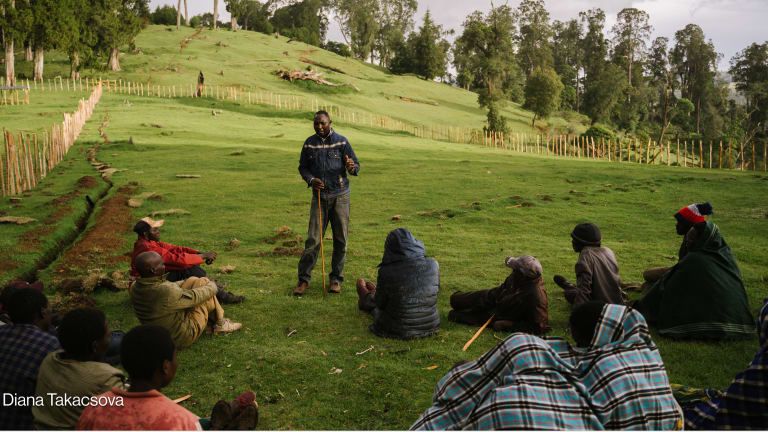
In 2020, 227 environmental activists were killed, according to a report from Global Witness. The deadliest year on record, it’s thought many more went undocumented.
It’s “extremely dangerous” to be an environmental activist in 2021, Steve Trent, CEO at the Environmental Justice Foundation, told Devex in an email. “And as the scramble for resources intensifies under the climate and biodiversity crises, there is every reason to think it will get worse,” he said.
As more people join the fight to combat climate change and advocate for their environment, more must be done to protect them, experts say.
Why activists are at risk
Candido Pastor, technical manager at Conservation International in Bolivia, said when it comes to the forest in the Amazon basin, the issue is that resources, such as gold and oil, are under the rule of the national governments.
“But this gold and oil is under the land of Indigenous territories,” he said. “This is a legal conflict … and an economic conflict because the countries need the resources for the national priorities, but at the same time people [are] living there in a cultural way and maintaining the forest.”
Of the activists killed last year, over a third were Indigenous people and the majority of murders took place in Latin America.
“As long as the message is that you can, quite literally, get away with murder, there is little disincentive to commit those crimes.”
— Laura Furones, senior adviser for the land and environmental defenders campaign, Global Witness“Overwhelmingly, it’s those who are standing in the way of corporate profits by defending their local environment who have been most at risk, with especially high risks for Indigenous environmental defenders,” Trent said.
In Colombia — which had the highest number of reported killings of activists in 2020 — the perpetrators tend to be criminal organizations that plant illicit crops for drug production, paramilitary groups, rebel groups, government security forces, and companies, said Nikita Bulanin, adviser at the International Work Group for Indigenous Affairs — an organization working to protect Indigenous peoples’ rights.
The Prey Lang Community Network is a Cambodian community group that monitors and protects the Prey Lang rainforest from illegal logging and destruction. In an email, its members explained how — aside from killings — phone threats from perpetrators and local authorities as well as arrests and lawsuits aren’t uncommon for its members. Sometimes, they said, illegal loggers try to prevent Prey Lang community members from entering the forest and the authorities have banned them from patrolling the forest.
Despite the risks, the increasing violence won’t put activists off their task of protecting their environment, believes Laura Furones, senior adviser for the land and environmental defenders campaign at Global Witness. “Many people are aware they’re risking their lives, but it doesn’t stop them because we’re talking about their livelihoods,” she said.
If natural resources are exploited by corporations or governments, it can affect local people’s access to such resources that they may depend on to grow crops and earn a living.
“It’s all of our responsibility to make sure they’re protected rather than killed,” Furones added.
But that’s easier said than done when many of the individual perpetrators are unknown. In Mexico, up to 95% of the killings go unprosecuted.
“What we see in many cases is that, after murders happen, there are no investigations that end up in perpetrators being arrested and brought to court of law,” Furones said. “In fact, when that happens, it’s usually the material perpetrators — the man shooting the gun — that are caught, whereas the intellectual perpetrators — those who plan the murder — go unpunished.”
How to protect the protectors
Governments should start, Furones said, by looking at why the killings are happening in the first place and who’s behind them. “As long as the message is that you can, quite literally, get away with murder, there is little disincentive to commit those crimes,” she added.
For Trent, a part of this is ensuring the necessary laws — and the ability to enforce them when a person is intimidated, harmed, or assassinated — are in place. “For example, legislative proposals for supply-chain due diligence … must cover protections for environmental and human rights defenders, and include liability for companies who turn a blind eye to or commit violence against activists,” he said. “Allowing impunity to reign when activists are attacked encourages and perpetuates the cycle of violence.”
Companies also have an obligation to ensure they’re operating in ways that don’t go against human rights, Furones said. According to the report, “many companies engage in an extractive economic model that overwhelmingly prioritizes profit over human rights and the environment.” This is what leads defenders to take up their cause, putting them in danger.
It calls for companies and investors to implement due diligence systems that prevent human rights and environmental harms throughout their supply chains and operations while adopting “a zero-tolerance stance on reprisals and attacks on land and environmental defenders.”
Last week, the United Nations’ Human Rights Council formally recognized the human right to a healthy environment. At the time of the announcement, David Boyd, U.N. special rapporteur on human rights and the environment, urged governments, in a statement, to incorporate the right to a safe, clean, healthy, and sustainable environment into their constitutions and legislation and to put human rights at the center of their actions.
“This resolution is especially important for all of the environmental human rights defenders working, often at great personal risk, to safeguard the land, air, water and ecosystems that we all depend on,” he said.
The European Commission is currently reviewing legislation that would determine what companies can and cannot do to “address human rights and environmental harms” when operating in the European Union.
“Those pieces of legislation are essential because they provide all of us a great opportunity to hold to account those companies that are operating freely,” Furones said.
Consumers and governments can also pressure companies to only provide services and products that adhere to human and environmental standards and rights, Bulanin said.
“NGOs have a role to play here as well, by documenting abuses, providing platforms to amplify the voices of local activists, and helping victims and survivors to pursue justice in court, and to pressure corporate actors to do more to safeguard the environment and protect the communities who depend on it,” Trent said.
Many organizations offer protection mechanisms, Furones said. Front Line Defenders, for example, runs an emergency hotline for at-risk defenders, provides grants to cover security needs, and runs security and protection training.
Some communities take it upon themselves to protect one another. In Colombia, a voluntary and community-led Indigenous Guard acts as “a humanitarian and civil resistance mechanism” working to safeguard local territories without weapons.
Bulanin also urged NGOs to support local initiatives such as community monitors who alert one another to specific threats, “because they are adapted to the local needs, they’re created with [an] understanding of the local environment, and also are culturally and local-context sensitive,” he said.
Pastor suggested donors be obliged to direct at least 30% of conservation project funding into protecting the land and the defenders, while civil society organizations should create spaces to discuss the best way to respond to the different interests that governments, companies, and defenders have.
Search for articles
Most Read
- 1
- 2
- 3
- 4
- 5








